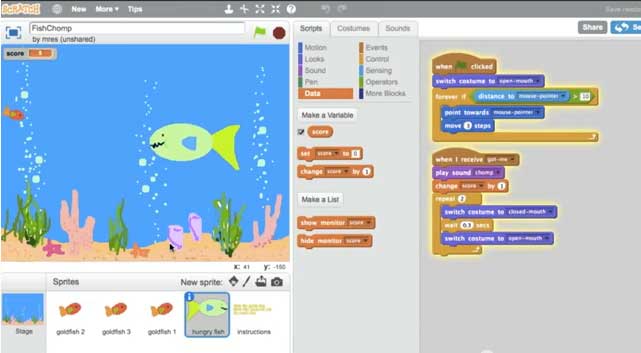In the horse and buggy era, being literate meant knowing how to read and write. Knowing how to interact with other humans was a basic step towards becoming a functioning member of society. However, since then the bar has been raised. Computers have now become so integrated into everything we do, that knowing how to interact with humans as well as computers is now a basic step towards becoming a functioning member of society.
Folks might be able to get by these days knowing only how to read and write, for a while longer, but please don’t shortchange your children. Consider also teaching them to program, suggests MIT’s Mitch Resnick of the MIT Media Lab’s Lifelong Kindergarten Group in the following TEDx video:
In my generation, computers were a new thing, strange and mysterious. Only the uber-geeks learned to program them, to have the computers perform desired tasks by “speaking” instructions to the computers using cryptic languages. The pseudo-geeks played video games on computers, and everyone else watched them from a safe distance on the big screen, in movies such as WarGames (25th Anniversary Edition) and 2001: A Space Odyssey.
Those were the days of phone phreaking, reading programs off of tape drives, machine language, and connecting computers to each other via acoustic couplers.
However, the world has evolved since then. What were once “geekish” interests are today’s “minimum competencies.”
The basic idea is that you want your kids to be able to express themselves with new technologies (creating new apps, making new devices, designing new websites), not just be passive consumers of technology (browsing, chatting, texting, and gaming with applications other people created).
I often hear parents tell me their kids are so brilliant with new technologies, that their kids can use their new video game system, or can setup their new iPhone, or whatever. But when I ask what have their kids created, what apps have they programmed, what have they made with these new technologies–I am almost universally met with blank stares.
That’s sad.
There is a need for kids today to comfortable and fluent with new technologies, not just as consumers but as makers. This means needing to be able to write their own programs, create their own games, make their own applications, design their own websites, not just passively using computers like mobile TVs.
Learning to read AND write AND program is the new literacy, the new fluency. This literacy is driving a generational shift back to making, creating, and doing, as seen in Chris Anderson’s Makers: The New Industrial Revolution and as explained in this clip by Adam Savage on why we make:
Today, children have available visual, intuitive languages and interfaces to interact with the computers to realize their visions and designs. Instead of playing someone else’s game, you create your own game. Instead of watching someone else’s movie, you create your own movie. Instead of watching someone else live a heroic life, you live your own.
Just as learning to read and write opened up opportunities for those living in generations long ago, today, programming opens up many new opportunities far beyond just learning to read and write, whether or not the person wants to be an engineer or a computer scientist.
Consider the example of musician and company creator Derek Sivers, who advocates for learning the basics of how to program, no matter what your age:
“Yes, learn basic programming.”
This ability to program, as well as the ability to read and write, is becoming essential to full participation in today’s society. It’s not just so you or your child can become an expert at programming. That’s not the main point. A more fundamental point is the following: If you become literate in technology, can program it as well as use it, then you are no longer a helpless individual. You can do the tasks yourself or hire someone else competent to help you. You have choice. You have freedom. You have opportunity.
Start learning now. Why wait?
